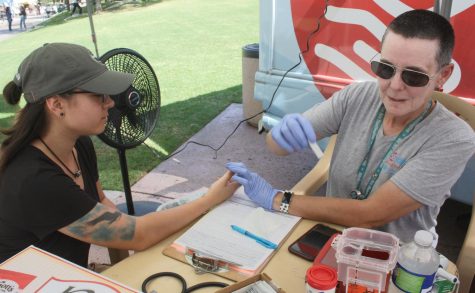Blood Drive To Take Place Nov. 1 through Nov. 2
Blood drives play an essential role in saving the lives of many people through the donation of blood for medical patients who require specialized blood treatments. Glendale Community College is hosting a Blood Drive on Tuesday, Nov. 1 and Wednesday, Nov. 2 from 9 a.m. to 3 p.m.

The blood drive was organized by Aida Avanousian, the student service manager at GCC. “Anyone can donate blood including students, staff, and the community,” said Avanousian in an interview about the event.“We have scheduled multiple blood drives to be on campus during the fall semester. The one in November was scheduled by myself and it is on behalf of the Huntington Health Center. The other blood drive is supported by ASGCC.”
Blood donation benefits many people who are going through medical difficulties through the whole blood cells being used to extract other beneficial substances that can help medical patients with their treatments. “Whole blood donation is the most common type of blood donation. During this donation, you donate about a pint (about half a liter) of whole blood. The blood is then separated into its components — red cells, plasma and sometimes platelets,” according to a Mayo Clinic article. The article explains how a person goes through whole blood donation and that the donated blood can be used for its red blood cells, plasma, and platelets. Blood donations also require diversity in its blood supply.
“Maintaining diversity in the blood supply is essential. Some blood types are quite rare and are likeliest to be found among people with shared ancestral origins,” according to an article from the Red Cross. Diversity in blood supply is crucial to ensure the health of people who are in medical need of blood treatments because of the differences in blood types and those of similar shared ancestral origins. Cancer patients also require blood transfusions. “For cancer patients, blood transfusions can act as a resource to implement platelets back into the body after heavy treatments such as chemo or radiation therapy. For cancer patients, blood cells that are made in the bone marrow are often at risk. This lack of blood cell production can cause chronic diseases over time which may affect organs such as the kidneys, spleen and liver,” the Red Cross article continues.
Anyone can come to see if they are eligible to donate blood.
